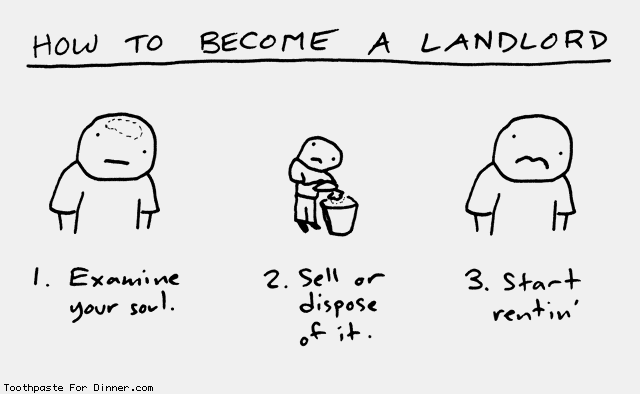So you have become a landlor what
Post on: 23 Апрель, 2015 No Comment

By Caroline Battista | Jun-05-2012 | Blog. General Tax. Homeowners. Rental Properties
Canadian house prices are rising, and a tenant in a basement apartment can help pay the mortgage. Also, buying a second property as a rental looks like a good investment. But being a landlord means you receive rental income and the Canada Revenue Agency will want you to report it.
If you are renting a room to a relative for less than Fair Market Value (FMV), this is not considered income and you do not have to report it on your tax return. However, if you live in a province with a rent credit, the relative paying rent will not be able to claim the credit.
But landlords who charge FMV rent will need to complete a T776 Form – Statement of Real Estate Rentals – to report income and expenses.
If you have one rental property, you can only claim mileage to transport tools and materials to do repairs. If you have multiple rental properties and travel to pick-up rent cheques, you can claim this mileage. And if your property is in another province, your airfare to check it out is not allowed either. However, you can claim expenses like mortgage interest, property taxes, insurance, utilities and condo fees. And if you are between tenants, you can claim these expenses as well. You can also claim repairs and maintenance to the unit once it has been rented. These are considered current expenses.
If you repaired or renovated your rental unit prior to renting it, the cost of the work is considered a capital expenditure. This means that it is added to the cost of the building, which will reduce your capital gain when you sell the property, but cannot be claimed as a current expense. The same treatment will apply to any capital improvements you make after you begin renting it out. However, simple repairs which do not constitute an improvement to the property can be claimed as a current expense.
People with a rental unit in their principal residence will need to pay capital gains on the portion of the house being rented when they sell. So, if a basement apartment takes up 20 per cent of the square footage of a home, you need to calculate the capital gain on 20 per cent of your home when you sell. Since you are using space in your principal residence to earn income, you lose the capital gains exemption on this part of the house. However, you would not lose the exemption if the rooms you were renting out did not constitute a separate unit and you do not claim capital cost allowance .
If you rent out a room of your home, you are restricted on the expenses you can claim for the shared space. You can base it on factors such as availability or the number of persons sharing the room. For example, if there were three family members and one lodger, you could claim 25% of the expenses for the use of the shared area or rooms. You also need to calculate the percentage based on square footage of the lodger’s exclusive-use rooms and then claim a portion of the related expenses.
And if you are selling your rental property this year, you will need to report the capital gain or loss on your tax return. Capital gains are calculated by taking your selling price and subtracting the purchase price, capital expenses and selling costs. The actual amount of tax you will pay depends on your gain and your income for the year. But only 50 per cent of capital gains are taxed.
Renting a space in your home or buying a rental property may be a good financial move, but as with most financial endeavours there are tax implications that you must consider.
Similar Blog Posts
It is that time of year again. NETFILE officially opens for 2014 tax returns. NETFILE is the Canada Revenue Agency’s do-it-yourself online filing service for personal income tax and benefits. Using []
Taxes aren’t always an intuitive topic. Every month we will post frequently asked or interesting questions we receive. Here is the January edition of Dear Tax Pro. Q: I worked for []
The start of a new year usually marks the beginning of the marketing of Registered Retirement Saving Plans (RRSPs) by financial institutions. It sounds like a good idea and you []














